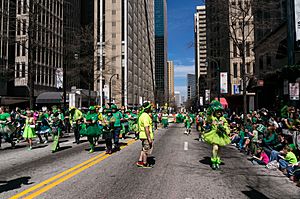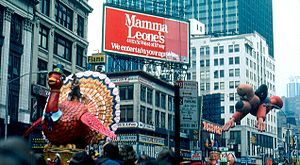Public holidays in the United States facts for kids
Quick facts for kids Public holidays in the United States |
|
|---|---|
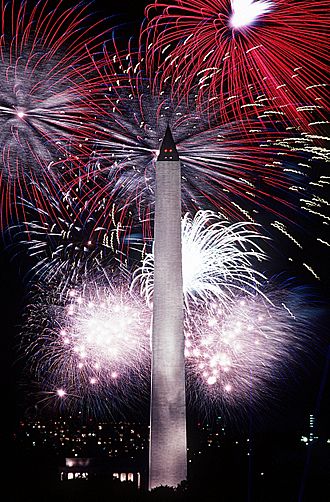
Public • Federal • Observance • School • Hallmark
|
|
| Observed by | Federal government State governments Local governments Private and public sector employers |
| Type | National |
| Date | Lua error in Module:Wikidata at line 132: attempt to index field 'wikibase' (a nil value). |
In the United States, public holidays are special days set by the U.S. government, states, and local areas. On these days, government offices often close, and many government workers get time off with pay.
The federal government does not make private businesses close or give paid time off. So, businesses decide which holidays they want to observe.
Some federal holidays are widely celebrated by private businesses. These include New Year's Day, Memorial Day, Independence Day, Labor Day, Thanksgiving, and Christmas. Businesses often close or give paid time off for New Year's Eve, Christmas Eve, and the Day after Thanksgiving. However, these are not federal holidays.
Most federal holidays are celebrated on a Monday or Friday. This creates a three-day weekend for many people. Christmas is the only religious holiday that is also a federal holiday. Some businesses let employees take paid time off for their own religious celebrations.
Other holidays, like Halloween and Valentine's Day, are very popular in the U.S. but usually do not include paid time off from work.
What Are U.S. Public Holidays?
As of 2021, the United States has eleven yearly federal holidays in the United States. There is also one extra holiday every four years called Inauguration Day. This day happens when a new U.S. President takes office.
Since 1971, most official holidays are celebrated on a Monday. This is due to the Uniform Monday Holiday Act of 1968. However, some holidays like New Year's Day, Juneteenth, Independence Day, Veterans Day, Thanksgiving, and Christmas are not always on a Monday.

All current federal holidays are also public holidays in all 50 states. But each state does not have to celebrate them on the same exact dates. Many states also have extra holidays that the federal government does not observe. Many businesses also celebrate certain holidays, even if no government agency requires it.
Since 2000, some cities and states have created celebrations for Malcolm X Day and Rosa Parks Day. These are in addition to the federal Martin Luther King Jr. Day. These holidays celebrate the African American community with festivals and parades. For example, Illinois and Berkeley, California honor Malcolm X with a legal holiday where offices close. Missouri honors Rosa Parks on her birthday.
The United States is a very diverse country. Many workplaces celebrate different religious and ethnic holidays. Examples include Saint Patrick's Day, Kwanzaa, Diwali, Mardi Gras, and Cinco de Mayo.
Christmas is the holiday with the most greeting card sales. Large stores like shopping malls usually close only on Thanksgiving and Christmas. They stay open on all other holidays. They might close early on Christmas Eve and New Year's Eve.
Most large companies close on the main holidays. These are New Year's Day, Memorial Day, Independence Day, Labor Day, Thanksgiving, and Christmas. Some non-retail businesses close the day after Thanksgiving. However, federal banks and post offices cannot close that day. Some smaller businesses that are usually open on Sundays might close on Easter Sunday if they expect few customers.
Federal Holidays in the U.S.
Here are the federal holidays that most private businesses celebrate with paid time off:
- New Year's Day (January 1)
- Memorial Day (A Monday between May 25 and 31)
- Independence Day (July 4)
- Labor Day (A Monday between September 1 and 7)
- Thanksgiving (A Thursday between November 22 and 28)
- Christmas (December 25)
Other federal holidays are not as widely observed by businesses. These include:
- Martin Luther King Jr. Day (A Monday between January 15 and 21)
- Washington's Birthday (A Monday between February 15 and 21)
- Juneteenth (June 19)
- Columbus Day (A Monday between October 8 and 14)
- Veterans Day (November 11)
Juneteenth became the newest federal holiday in 2021. In its second year as a federal holiday, about 30% of private employers gave paid time off for it.
Holidays with Religious Meaning
The United States has many different religious beliefs and practices. The First Amendment to the United States Constitution says that Congress cannot make laws about religion or stop people from practicing their religion. This has allowed many different faiths to grow in the U.S.
In 2002, most Americans said that religion was "very important" in their lives. This is a higher number than in many other developed countries. In 2012, most Americans (73–80%) said they were Christians. About 15–20% said they had no religious connection. Other religions like Islam, Judaism, Buddhism, and Hinduism made up about 4% of the adult population.
Christian Holidays
About 65% of adults in the U.S. identified as Christian in 2019. Many holidays from the Christian calendar are celebrated by this group. Many businesses and governments close on Christmas.
Some private businesses and other places close on Good Friday. The financial and stock markets also close on Good Friday. Most stores stay open, but some might close early. Public schools and most universities close on Good Friday. This might be a holiday on its own or part of spring break. The postal service works, and banks regulated by the federal government do not close for Good Friday.
Many companies, including banks, malls, and most private stores that are usually open on Sundays, close on Easter.
Hindu Holidays

The Hindu holidays of Diwali and Holi are celebrated in some parts of the United States. This is mostly by Indian Americans or people of Indian descent. Holi, known as the "festival of colors," has even inspired a Broadway musical. These holidays are not officially recognized in most of the U.S. However, the New York City Council has officially made them school holidays in New York City.
Jewish Holidays
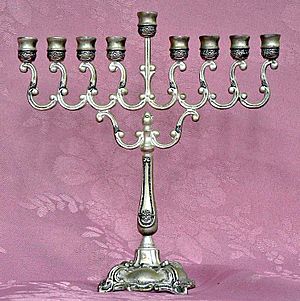
The three most celebrated Jewish holidays are Rosh Hashanah, Yom Kippur, and Hanukkah. Passover and Yom Kippur, along with Rosh Hashanah and Hanukkah, are recognized as optional state holidays in Texas. All Jewish holidays begin the night before, as that is when the Jewish day starts.
Islamic Holidays
The main Islamic holidays of Ramadan, Eid al-Fitr, and Eid al-Adha are recognized in the United States. You can find these holidays on calendars from major manufacturers. Schools in New York and Michigan (especially Dearborn) may close to observe Muslim holidays.
Holidays with Cultural or Historical Meaning
African American Holidays
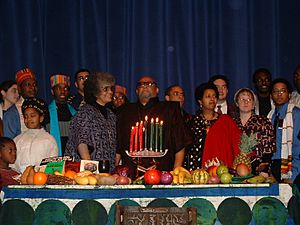
Some holidays in the United States celebrate or recognize the fight of African Americans for freedom from slavery and for civil rights. Two of these are federal holidays:
- Martin Luther King Jr. Day: This holiday is celebrated on a Monday between January 15 and 21. It honors the birthday of Dr. King, a very important leader of the Civil Rights Movement. This holiday became federal in 1983 and was first celebrated in 1986.
- Juneteenth: This holiday is celebrated on June 19. It remembers the announcement that slavery was abolished in Texas in June 1865. More generally, it celebrates the freedom of enslaved African Americans. The name "Juneteenth" is a mix of "June" and "nineteenth." It has been a federal holiday since 2021.
Some states and cities have extra holidays honoring African Americans:
- Emancipation Day: Celebrated in Florida, Georgia, Kentucky, Maryland, Mississippi, Tennessee, Texas, Virginia, Washington, D.C., Puerto Rico, and the US Virgin Islands. The dates vary based on when enslaved people were freed in those areas.
- Harriet Tubman Day: Celebrated in New York and parts of Maryland on March 10.
- Malcolm X Day: Celebrated in Illinois and Berkeley, California, on May 19. It is also an unofficial holiday in cities like Atlanta, Philadelphia, and Washington, D.C.
- Rosa Parks Day: Celebrated in Missouri on February 4, in California and Michigan on the following Monday, and in Ohio on December 1.
A significant African American cultural celebration is Kwanzaa. It is observed from December 26 to January 1. This holiday was created by Maulana Karenga in 1966. It honors African heritage in African-American culture.
Confederate Holidays
Some states celebrate holidays honoring the Confederate States of America. These states left the United States during the Civil War. Many of these state holidays were created in the early 1900s, about 50 years after the Civil War ended. They were part of a belief called the Lost Cause of the Confederacy.
- Confederate Memorial (or Heroes) Day: Celebrated in Alabama, Florida, Kentucky, Mississippi, South Carolina, Louisiana, and Texas on different days.
- Robert E. Lee Day: Celebrated on or around Lee's birthday (January 19). Alabama and Mississippi still combine this with Martin Luther King Jr. Day. Arkansas used to combine them but changed its law in 2017. Now, Arkansas has a state memorial day for Lee on the second Saturday of October.
- Confederate History Month: This has been declared in Alabama, Florida, Georgia, Louisiana, Mississippi, Texas, and Virginia. It is usually in April to go along with Confederate Memorial Day.
Other Traditional and Informal Holidays
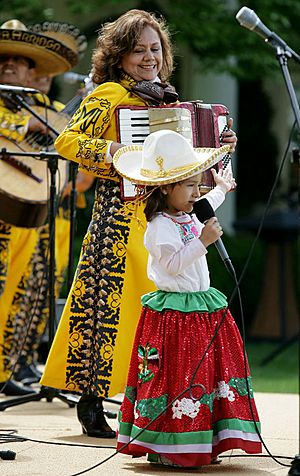
Besides federal holidays, many other religious, ethnic, and traditional holidays fill the calendar. There are also lighter celebrations. Businesses rarely observe these as official holidays. In fact, many are seen as chances for stores to promote sales. Because of this, some people call these days "Hallmark holidays," after the Hallmark greeting card company.
- Groundhog Day, February 2
- Valentine's Day, February 14
- Saint Patrick's Day, March 17
- April Fool's Day, April 1
- Patriots' Day (Revolutionary War), April 15
- Earth Day, April 22 (date varies)
- Arbor Day, a Friday between April 24 and 30
- May Day, May 1
- Cinco de Mayo, May 5
- Mother's Day, a Sunday between May 8 and 14
- Flag Day, June 14
- Helen Keller Day, June 27
- Father's Day, a Sunday between June 15 and 21
- Pioneer Day, July 24
- Women's Equality Day, August 26
- Patriot Day, September 11
- Constitution Day and Citizenship Day, September 17
- Oktoberfest, various days in September/October
- World Vegetarian Day, October 1 (starts Vegetarian Awareness Month)
- Halloween, October 31
- Election Day (also Democracy Day), a Tuesday between November 2 and 8
- Black Friday, a Friday between November 23 and 29
- Cyber Monday, a Monday between November 26 and December 2
- Pearl Harbor Remembrance Day, December 7
- New Year's Eve, December 31
Other Notable Holidays

- Opening Day: This is in late March or early April. It marks the start of the Major League Baseball season. Many see it as a sign that summer is coming.
- Winter break: Schools are off for two weeks in early winter.
- Spring break: Schools are off for one week in early spring.
- Summer vacation: Schools are off for the summer months.
- Super Bowl Sunday: This is the second Sunday in February. It is the day of the National Football League's championship game. People usually have parties at home and watch the game with snacks and drinks.


